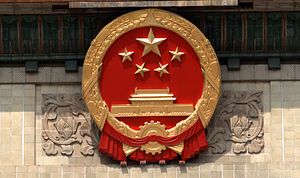Five years ago, Wukan, a small and until then relatively unknown Chinese village in Guangdong province, seized global headlines. In December 2011, many of Wukan’s denizens publicly took to the streets, blockading roads as they protested what they saw as government disregard for their interests. Local Party officials had, without seeking proper authorization, sold land for commercial land. While the protests initially made headlines, what left Wukan a well-remembered name among China watchers was the Chinese Communist Party’s reaction.
Instead of a bloody crackdown against popular will, as in the case of Tiananmen in June 1989, the provincial party chief of Guangdong at the time, Wang Yang (now a vice premier of the State Council), intervened peacefully, hearing out demands. Remarkably–and this is really where the Wukan story took off as a rare instance of democracy with Chinese characteristics–Wang promised free elections for local government and a government investigation into the malfeasance that had led to the popular uprising in the first place. (Elections aren’t alien to China, but tolerance for popular protest airing political grievance is.)
The ‘Wukan moment’ didn’t particularly draw much interest from outside observers after 2012. Those who cared to follow up and check in on Wukan’s progress as China’s little petri dish for democracy, like The Diplomat‘s Shannon Tiezzi in 2014, found that though ballots had been cast and the mechanisms of democracy had been exercised, little had changed on the ground. Two years ago, I was also reminded of Wukan in the context of the Chinese government’s possible reactions to Hong Kong’s Occupy Central movement (the Tiananmen alternative seemed unthinkable in Hong Kong at the time).
Wukan, however, is back in the headlines today. In the past few days, protesters have taken back to the streets to protest the detention of a local leader. Remarkably, in a swift erasure of Wukan’s experiment with democracy, the Public Security Bureau for Lufeng–the larger city that oversees Wukan’s affairs–released a statement noting that Lin Zuluan, Wukan’s Party secretary, was being held under investigation for crimes, including accepting bribes and abusing power.
Lin was one of the leaders of the 2011 uprising and, as a result of the visibility he gained then, triumphed in the elections that were held with Wang Yang’s blessing. With Lin in detention, the Lufeng Public Security Bureau has already sent out warnings to the villagers: “We call on all villagers to actively support and cooperate with the work of the legal authorities and defend hard-won social stability,” the Bureau’s statement said, according to the New York Times. “Don’t be incited by a small number of lawbreakers to use drastic measures.”
We don’t know how this latest episode in Wukan’s democratic story will end, but already reports suggest that anywhere between two to three thousand people are publicly protesting at a local police station. It’s notable that Lin was brought in for corruption charges too. Chinese President Xi Jinping has famously sought to weed out corrupt officials at all levels of Party business, and China watchers don’t doubt that Xi’s deployed the feared Central Commission for Discipline Inspection for political ends in the past. Finally, China’s powerful state censorship apparatus has already taken to blocking the terms “villagers” and “Wukan” from popular social networking site Weibo.
Bringing Lin down does send an important message to provincial party chiefs who may consider Wang’s 2011-2012 precedent as a model worth emulating. After all, the original Wukan episode took place under the last generation of CCP leadership, under Hu Jintao. Wang, who developed a reputation as a ‘liberal,’ not only for his intervention in Wukan, but for his progressive ‘Happy Guangdong’ development model, was a Hu protege. In contrast to the Hu era, Xi’s project to consolidate power under the centralized leadership of the Party necessitates the erosion of any idea that the sort of flexibility shown in 2011 could be tolerated.
An alternative explanation–given that high-level Party interest in a small Guangdong fishing village for intra-party political signaling is unlikely–is that Lin perhaps transgressed somehow against Party loyalty. After all, a core characteristic of the original Wukan uprising was that while discontentment with local government was aired publicly by the protesters, there was no wider movement to question loyalty to or the supremacy of the Party.
Alternatively, Lufeng city officials could be seeking retribution for grievances that have been brewing for five years. Wang’s intervention saved Wukan, but the Lufeng government was eager to stamp out the protests. In 2014, in an episode reminiscent of Lin’s current predicament, the Lufeng Public Security Bureau put Hong Ruichao, a deputy chief of Wukan, under criminal inquiry for corruption. Hong, along with Yang Semao, another popularly elected leader, was jailed in October 2014.
In any case, Lin’s arrest doesn’t bode well for the Wukan experiment and could be the end of the Wukan story more broadly. In some ways, the 2016 protests will offer a real world test of exactly how different the Xi-era response to popular uprising can be to the Hu-era leadership. As of this writing, the protests continue. One hopes the protesters and Lin find a satisfactory and just solution to their predicament, free of coercion or violence.
One resident told Radio Free Asia that “Now, things are back to where they were back then (in 2011), and local people are barricading the roads.” Unlike, 2011, however, the Party’s under new management.
Update: On Tuesday, Lin’s confession was broadcast on state television.

































